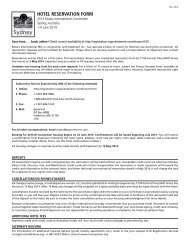Group Study Exchange - Rotary International
Group Study Exchange - Rotary International
Group Study Exchange - Rotary International
You also want an ePaper? Increase the reach of your titles
YUMPU automatically turns print PDFs into web optimized ePapers that Google loves.
<strong>Group</strong> <strong>Study</strong> <strong>Exchange</strong><br />
AN An INTERNATIONAL intErnAtionAl EXCHANGE ExchAnGE PROGRAM proGrAm<br />
FOR for YOUNG younG PROFESSIONALS<br />
profESSionAlS<br />
TEAM Team HANDBOOK handbook
The mission of The <strong>Rotary</strong> Foundation is to enable<br />
the Rotarians mission to advance of the rotary world foundation understanding, is to goodwill, enable<br />
rotarians and to peace advance through world the improvement understanding, of health, goodwill, the<br />
and support peace of through education, the and improvement the alleviation of health, of poverty. the<br />
support of education, and the alleviation of poverty.<br />
The <strong>Rotary</strong> Foundation is a not-for-profit corporation<br />
the rotary that is foundation supported solely is a not-for-profit by voluntary contributions<br />
corporation<br />
that is supported from Rotarians solely and by voluntary friends of the contributions Foundation<br />
from rotarians who share and its friends vision of for the a better foundation world.<br />
who share its vision for a better world.
Contents<br />
GSE Timeline 2<br />
Introduction 3<br />
Goals and Objectives 3<br />
The Team 4<br />
The Team Leader’s Role 4<br />
The Team Member’s Role 5<br />
Finances 7<br />
The <strong>Exchange</strong> 8<br />
Preparation 8<br />
Orientation 10<br />
Cultural Awareness 11<br />
Post-<strong>Exchange</strong> Obligations 11<br />
Alumni Opportunities 12<br />
Resources 13<br />
Forms<br />
Biographical Data Form 14<br />
Certification of Insurance 15<br />
Medical Certificate 16<br />
GSE Evaluation Form 17-18<br />
GSE Final Report 19-20<br />
GSE News Tip 21
GSE Timeline<br />
Below is a short timeline to aid you in successfully planning for your team’s <strong>Group</strong> <strong>Study</strong> <strong>Exchange</strong> (GSE).<br />
June-July<br />
District GSE chair receives team-leader and team-member applications, program guides, and promotional<br />
materials electronically. Alumni pins are sent by post.<br />
At least six months before departure<br />
GSE selection committee interviews team-leader and team-member candidates and makes final selection.<br />
Forty-five days before departure<br />
Host itineraries must be submitted electronically to GSE coordinator at The <strong>Rotary</strong> Foundation and<br />
approved by the visiting team.<br />
Team member applications and Certification of Insurance and Medical Certificate must be submitted<br />
electronically to district GSE chair, who submits them to the Foundation.<br />
GSE Team Travel Request Form must be submitted electronically by the GSE chair or team leader to the<br />
GSE department and <strong>Rotary</strong> <strong>International</strong> Travel Service or designated agency.<br />
Note: If all completed predeparture documents are not received by the Foundation at least 45 days before<br />
departure, the GSE may be DELAYED (within the 2012-13 program year) or CANCELLED.<br />
Two months after return<br />
GSE team final reports are due to the district GSE chairs and district governors of both the host and<br />
sending districts. The GSE chair or team leader must submit a copy electronically to the Foundation.<br />
2 | GROUP STUDY EXCHANGE
Introduction<br />
What Is <strong>Group</strong> <strong>Study</strong><br />
<strong>Exchange</strong>?<br />
The <strong>Group</strong> <strong>Study</strong> <strong>Exchange</strong> (GSE) program<br />
is a unique cultural and vocational exchange<br />
opportunity for young business and professional<br />
men and women in their initial years<br />
of professional life. <strong>Rotary</strong> districts in different<br />
countries are paired to send and receive<br />
professional study groups of four to six non-<br />
Rotarian team members and one Rotarian<br />
team leader to travel for four to six weeks,<br />
staying in the homes of Rotarians when<br />
possible.<br />
Launched in 1965, this dynamic program<br />
has built a successful track record at the<br />
personal, community, and international<br />
level. With good planning, a goal-driven<br />
itinerary, and active participation of dedicated<br />
Rotarians, a GSE can be an exceptional<br />
educational experience for both the visiting<br />
GSE team and local Rotarians.<br />
Goals and Objectives<br />
The GSE program is designed to develop<br />
professional and leadership skills among<br />
young adults, so that they can address the<br />
needs of their communities and an increasingly<br />
global workplace.<br />
GSE participants follow an extensive and<br />
rigorous program of international travel and<br />
team activities.<br />
• Vocational visits<br />
— Provide opportunities to observe vocations<br />
as practiced in another country<br />
— Impact team members’ long-term<br />
careers through exchange of ideas in<br />
their respective fields<br />
• Cultural experiences<br />
— Allow participants to study another<br />
country and its people, language, and<br />
institutions through experiences in an<br />
organized and meaningful host<br />
program<br />
— Promote an appreciation of cultural<br />
diversity worldwide<br />
• Fellowship opportunities<br />
— Encourage team members and hosts<br />
to meet, communicate, and live with<br />
each other in a spirit of fellowship and<br />
goodwill<br />
— Consider each other’s problems,<br />
aspirations, and community concerns<br />
— Foster lasting friendships and international<br />
understanding<br />
• Rotarian involvement<br />
— Offers Rotarians specific, practical,<br />
and meaningful opportunities for<br />
international service by providing<br />
young, formative professionals a<br />
different perspective of their vocation<br />
in another country and culture<br />
Inspiring others<br />
Before this exchange<br />
I understood the<br />
philosophy behind<br />
the work that<br />
<strong>Rotary</strong> does,<br />
I understood how<br />
it began and what<br />
it aimed to do.<br />
I understood the<br />
structure as seen on<br />
paper, but I never<br />
actually realised<br />
what a powerful<br />
force <strong>Rotary</strong> is.<br />
Seeing firsthand<br />
what <strong>Rotary</strong><br />
accomplishes…has<br />
given me hope and<br />
a new perspective<br />
on changing the<br />
world. I have been<br />
inspired to do more<br />
and want to pass<br />
on that inspiration<br />
to others. <strong>Rotary</strong><br />
makes it all seem<br />
possible. I would be<br />
honoured to one day<br />
become a member of<br />
<strong>Rotary</strong>.<br />
— GSE Team<br />
Member from<br />
Australia upon<br />
returning from<br />
Brazil<br />
TEAM HANDBOOK | 3
The Team<br />
Leadership is much<br />
more an art, a<br />
belief, a condition<br />
of the heart, than a<br />
set of things to do.<br />
The visible signs of<br />
artful leadership<br />
are expressed,<br />
ultimately, in its<br />
practice.<br />
— Excerpt from<br />
leadership is an<br />
art by Max DePree<br />
The Team Leader’s Role<br />
The team leader is the Rotarian who has<br />
been selected to handle these responsibilities:<br />
• Build a team of individuals who will<br />
represent <strong>Rotary</strong> <strong>International</strong> and The<br />
<strong>Rotary</strong> Foundation with distinction and<br />
will gain personally and professionally<br />
from the GSE experience.<br />
• Read the GSE Program Guide for<br />
Rotarians (165-EN) and understand all<br />
policies and procedures related to GSE.<br />
(Please contact your GSE chair and/or<br />
coordinator at the Foundation with any<br />
questions.)<br />
• Complete the Biographical Data Form<br />
(see page 14) and submit it to the district<br />
GSE chair at least three months before<br />
departure.<br />
• Complete the following forms and submit<br />
them to the district GSE chair at<br />
least two months before departure:<br />
— GSE Team Leader Application (260-<br />
EN) with all appropriate signatures<br />
— Certification of Insurance and<br />
Medical Certificate (see pages 15-16)<br />
You must have insurance coverage of<br />
at least US$250,000 or equivalent for<br />
medical care and hospitalization for<br />
basic major medical expenses, including<br />
accident and illness expense, hospitalization,<br />
and related benefits; US<br />
$50,000 or equivalent for emergency<br />
medical evacuation; and US $50,000<br />
or equivalent for repatriation of remains.<br />
This insurance must be valid<br />
in the coun-try(ies) in which the team<br />
will travel, visit, and study during participation<br />
in the GSE program and be<br />
valid from the date of departure in the<br />
sponsor district through the official<br />
end of the trip. By requiring insurance<br />
herein, <strong>Rotary</strong> <strong>International</strong>/The<br />
<strong>Rotary</strong> Foundation does not represent<br />
that these coverages and limits will<br />
necessarily be adequate to protect the<br />
Participant. Participants should consult<br />
with an insurance professional to<br />
determine which coverages and limits<br />
will be adequate to cover them in the<br />
geographical location(s) visited. <strong>Rotary</strong><br />
<strong>International</strong>/The <strong>Rotary</strong> Foundation<br />
does not provide any type of<br />
insurance to the Participants of these<br />
programs.<br />
— GSE Team Travel Request Form in<br />
the GSE Program Guide for Rotarians<br />
(165-EN)<br />
— With the GSE chair, determine who<br />
will be the main contact with the<br />
<strong>Rotary</strong> <strong>International</strong> Travel Service or<br />
appropriate affiliate agency for travel<br />
arrangements. Follow the travel guidelines<br />
described in the GSE Program<br />
Guide for Rotarians.<br />
• Attend a minimum of 12 hours of predeparture<br />
orientation. Consider participating<br />
in a multidistrict GSE/scholar<br />
orientation weekend in your region so<br />
that all TRF award recipients can interact<br />
and meet alumni of the program. If a<br />
full weekend orientation is not possible,<br />
organize a series of short-term sessions<br />
where the team can focus on certain<br />
issues and study different aspects of GSE.<br />
• Keep in contact with the district GSE<br />
chair to maintain the latest information<br />
on the progress of the exchange.<br />
• If you do not speak the host country’s<br />
language with some fluency, plan to<br />
receive language instruction at least three<br />
4 | GROUP STUDY EXCHANGE
months before departure. You must have a<br />
basic knowledge of the language to facilitate<br />
communication for the GSE team.<br />
• Meet with the team on a regular basis<br />
before departure. Plan to<br />
— Discuss the host district and country<br />
through <strong>Rotary</strong> networks and community<br />
resources<br />
— Research the host country, invite guest<br />
speakers, or try foods from the host<br />
country<br />
— Prepare and practice your presentations<br />
— Educate team members about <strong>Rotary</strong>’s<br />
mission and what the district is doing<br />
to achieve it in the community<br />
• Remain with your team at all times,<br />
except for scheduled free time.<br />
• Debrief team members before leaving<br />
the host district or within six weeks of<br />
the official end of the tour. Include this<br />
information in your final report.<br />
• Write thank you letters to the host district<br />
governor and host GSE chair.<br />
• Submit the completed GSE Evaluation<br />
Form (see page 17) to the district GSE<br />
chair within two months of return.<br />
• Submit the GSE Final Report (see page<br />
19) to the district GSE chair within two<br />
months of return. Failure to submit post-<br />
GSE reports may delay the district’s participation<br />
in future Foundation programs.<br />
• Promote speaking engagements in your<br />
home district to share experiences, and<br />
involve the team in these presentations.<br />
The Team Member’s Role<br />
Team members have been chosen to represent<br />
<strong>Rotary</strong> <strong>International</strong> and The <strong>Rotary</strong><br />
Foundation during the GSE. In selecting<br />
the GSE team, the sponsor district has recognized<br />
each team member’s ability to gain<br />
from an international experience and to be<br />
an effective international ambassador for<br />
<strong>Rotary</strong>. Team members must do the following<br />
before, during, and after the exchange.<br />
• Ensure that the district GSE chair has<br />
a copy of your completed GSE Team<br />
Member Application (161-EN) with<br />
appropriate club and district endorsements<br />
and signatures.<br />
• Complete the Biographical Data Form<br />
(see page 14) and submit it to the district<br />
GSE chair at least three months before<br />
departure.<br />
• Complete the Certification of Insurance<br />
and Medical Certificate (see pages 15-16)<br />
and submit it to the district GSE chair at<br />
least two months before departure.<br />
• Attend a minimum of 12 hours of predeparture<br />
orientation. Participate in a<br />
multidistrict GSE/scholar orientation<br />
weekend in your region, if available. Use<br />
this time to work together on the team<br />
presentation(s) to <strong>Rotary</strong> clubs and at the<br />
district conference.<br />
• If you do not speak the host country’s<br />
language with some fluency, plan to receive<br />
language instruction at least three<br />
months before departure. Consult with<br />
the district about Foundation-funded<br />
language training for the whole team.<br />
• Prepare for visits with host families as<br />
described in “Preparation” on pages 8-9.<br />
• Review the host district’s program itinerary<br />
and make sure that appropriate<br />
vocational activities are arranged for you<br />
throughout the trip. If the agenda does<br />
not meet your professional needs and<br />
expectations, provide feedback to your<br />
team leader.<br />
• Remain with your team at all times,<br />
except for scheduled free time.<br />
• Attend all visits as scheduled.<br />
• Refrain from engaging in activities that<br />
could unnecessarily endanger or threaten<br />
the health, safety, or well-being of yourself<br />
or other participants. Such activities<br />
would include, but not be limited to,<br />
skydiving, bungee jumping, extreme<br />
sports, and operating heavy machinery.<br />
TEAM HANDBOOK | 5
prematurely due to travel safety concerns • Passport — your most important mea<br />
and you choose to stay, you accept all responsibility<br />
for your safe return home and have a current passport, apply immed<br />
of identification abroad. If you do not<br />
agree to forfeit your Foundation award. ately to obtain one in your country.<br />
• Refrain from engaging in any type of organizations such as schools and colleges,<br />
• and Visas <strong>Rotary</strong> — district permission conferences. from foreign gove<br />
• Write medical thank practice you or letters activity to including, host families<br />
upon but your not limited return to from routine the medical exchange. Discuss what you have learned from<br />
ments for you to enter their countries.<br />
procedures, surgical procedures, dental the exchange. The Foundation strongly<br />
practice, and contact with infectious<br />
encourages Consult your employer the team to attend leader at and immediat<br />
• Submit the GSE Evaluation Form (see<br />
diseases. Educational program participants<br />
least one start <strong>Rotary</strong> the club process meeting to after obtain the a visa in advance.<br />
to hear Contact your team’s your post-GSE host country’s loc<br />
page 17)<br />
are<br />
to<br />
reminded<br />
the district<br />
that if<br />
GSE<br />
they engage<br />
chair<br />
in<br />
within<br />
exchange<br />
two this months type of prohibited of return. activity, they are presentation. This will allow employers<br />
consulate to ensure that you have all n<br />
solely responsible for providing adequate to understand the significance of your<br />
• Submit insurance the and GSE for Final any and Report all liability (see page exchange essary experience. documentation before sending i<br />
19) that to the may district arise. GSE chair within two your application.<br />
months<br />
Additional required items<br />
• Should of you return. be required to return home<br />
prematurely due to travel safety concerns<br />
• Passport • Immunizations — your most important — normally means required<br />
• After and your choose return, to stay, accept you accept invitations all responsibility<br />
for your safe return home and<br />
to<br />
of identification only for abroad. certain If you African, do not Asian, and La<br />
have a current passport, apply immediately<br />
to obtain one in your country.<br />
speaking engagements at a minimum American countries. Check consular<br />
agree to forfeit your Foundation award.<br />
of five <strong>Rotary</strong> clubs, other appropriate websites for details.<br />
• Write thank you letters to host families<br />
• Visas — permission from foreign governments<br />
• for Money you to enter — cash their countries. in the local currency,<br />
organizations such as schools and colleges,<br />
and <strong>Rotary</strong> district conferences. Consult the<br />
upon your return from the exchange.<br />
credit<br />
team<br />
cards,<br />
leader and<br />
immediately<br />
ATM cards (optional<br />
Discuss • Submit what the GSE you Evaluation have learned Form (see from start the process to obtain a visa in advance.<br />
Contact your host country’s local<br />
the page exchange. 17) to the The district Foundation GSE chair within strongly<br />
two months of return.<br />
consulate<br />
• Club<br />
to ensure<br />
presentation<br />
that you have<br />
materials<br />
all necessary<br />
documentation ration,” pages before 8-9) sending in<br />
(see “Prep<br />
encourages your employer to attend at<br />
least • Submit one <strong>Rotary</strong> the GSE club Final Report meeting (see after page the your application.<br />
exchange 19) to the to district hear your GSE chair team’s within post-GSE two • Luggage — as little as possible, as you<br />
months of return.<br />
• Immunizations — normally required<br />
presentation. This will allow employers will be traveling frequently around the<br />
only for certain African, Asian, and Latin<br />
to • understand After your return, the accept significance invitations of to your American host countries. district Check consular<br />
exchange speaking experience.<br />
engagements at a minimum websites for details.<br />
of five <strong>Rotary</strong> clubs, other appropriate • Transportation to and from the airpor<br />
• Money — cash in the local currency,<br />
your home district<br />
credit cards, and ATM cards (optional)<br />
Strongly recommended<br />
• Photocopies of important documents<br />
(passport, visa, plane ticket, medical<br />
insurance policy). You can also scan an<br />
save these documents to a flashdrive to<br />
• Club presentation materials (see “Preparation,”<br />
pages 8-9)<br />
• Luggage — as little as possible, as you<br />
will be traveling frequently around the<br />
host district<br />
• Transportation to and from the airport in<br />
bring with you.<br />
your home district<br />
Strongly • recommended Emergency contact information in the<br />
• Photocopies<br />
host<br />
of<br />
country<br />
important<br />
and<br />
documents<br />
of family members o<br />
(passport, friends visa, plane at home ticket, medical<br />
insurance policy). You can also scan and<br />
save • these Health documents precautions to a flashdrive — to prescription<br />
bring with medication, you. spare glasses, sunscreen,<br />
• Emergency toiletries, contact information etc. in the<br />
host country and of family members or<br />
friends • at Telephone home card<br />
• Foreign language dictionary<br />
6 | GROUP STUDY EXCHANGE<br />
• Digital camera<br />
• Travel itinerary and information on th<br />
families you will be staying with
• Health precautions — prescription<br />
medication, spare glasses, sunscreen,<br />
toiletries, etc.<br />
• Telephone card<br />
• Foreign language dictionary<br />
• Digital camera<br />
• Travel itinerary and information on the<br />
families you will be staying with<br />
• Business cards, banners, team brochure,<br />
small host gifts, gift from your district<br />
governor to the host district governor<br />
(see “Preparation,” pages 8-9)<br />
Finances<br />
For each team member, the Foundation provides<br />
the most economical round-trip ticket<br />
between the home and host country(ies).<br />
Local Rotarians in the host area provide for<br />
meals, lodging, and group travel in their<br />
district. You are responsible for all personal<br />
and incidental expenses incurred before, during,<br />
and after the study tour. Here are a few<br />
recommendations for planning your finances<br />
for the tour.<br />
• Have sufficient personal funds to cover<br />
the following possible expenses:<br />
— Insurance coverage that meets the<br />
minimum level required by the<br />
Foundation<br />
— Visa, passport, and immunization<br />
expenses<br />
— Transportation to and from airports,<br />
or the common point of departure<br />
within the sponsor district<br />
— Entry and exit taxes<br />
— Excess baggage charges<br />
— Cost of any additional travel after the<br />
study tour<br />
— Any increase in airfare resulting from<br />
an avoidable delay in completing predeparture<br />
arrangements<br />
— Penalties resulting from changes in<br />
personal travel arrangements, including<br />
optional stopovers<br />
— Small gifts that you will take to your<br />
host families<br />
— Souvenirs you may wish to purchase<br />
in the host district<br />
• Obtain some foreign currency in<br />
advance.<br />
• Learn the bank schedules and accepted<br />
credit cards in the country you are visiting,<br />
as they vary by country.<br />
• Bring a pocket calculator or exchange<br />
calculator to help you with the rates.<br />
• Save all receipts of money changed.<br />
Many countries require you to show<br />
these receipts upon leaving (especially if<br />
you are converting foreign currency back<br />
to your home currency).<br />
• Keep two records of the numbers of your<br />
traveler’s checks and/or credit cards. Give<br />
one to a relative at home, and keep the<br />
other separate from your wallet. Maintain<br />
accurate records of which traveler’s<br />
checks you cash and where.<br />
• Visa and MasterCard are the most<br />
widely accepted credit cards. American<br />
Express offers the broadest range of<br />
services. Some credit cards offer travel<br />
insurance, shopping, and emergency<br />
cash services, but you will need detailed<br />
information on how to use these services<br />
while abroad.<br />
• Clean out your wallet. Leave unnecessary<br />
credit cards and your social security card<br />
at home.<br />
TEAM HANDBOOK | 7
The <strong>Exchange</strong><br />
Choose the lightest<br />
suitcase possible,<br />
fill it with the<br />
least amount of<br />
clothing that your<br />
courage will allow,<br />
close your eyes and<br />
remove half of what<br />
you have packed,<br />
and then rapidly<br />
depart.<br />
— Age-old advice<br />
Congratulations on being selected to represent<br />
your district and community while<br />
abroad. This is an excellent opportunity for<br />
you to become acquainted with another culture,<br />
develop professionally, and understand<br />
the mission and goals of <strong>Rotary</strong>. In order<br />
to benefit as much as possible from the exchange,<br />
please remember that GSE is an intensely<br />
rewarding but also rigorous program.<br />
Preparation<br />
To prepare for your exchange and activities<br />
that you will be involved in when you arrive<br />
in the host country, consider the following:<br />
Team presentations<br />
• The GSE team will attend several <strong>Rotary</strong><br />
club meetings and, in some cases, the<br />
district conference. You will be expected<br />
to make a two- to three-minute presentation<br />
about yourself in the language of the<br />
host country.<br />
— Ask the district GSE chair or team<br />
leader about the types of presentations<br />
expected and audiovisual equipment<br />
available. Not every club venue will be<br />
able to provide a computer hook-up<br />
or screen.<br />
— Many GSE teams prepare a slide show<br />
or PowerPoint presentation to use as<br />
part of their program, when feasible,<br />
in the host district. It is also a good<br />
idea to write a script of the presentation<br />
and, if necessary, have it translated<br />
for your hosts.<br />
• Treat these presentations as professional<br />
events and plan to represent your<br />
country diplomatically and clearly.<br />
• Business cards with photos are helpful<br />
when making new acquaintances. Hosts<br />
will also appreciate the opportunity<br />
to see how your name is spelled and<br />
pronounced.<br />
• Take along pictures of your family, pets,<br />
home, place of employment, etc. Sharing<br />
pictures with your host is a great way to<br />
break the ice.<br />
• If your team wishes to make a DVD to<br />
show in the host country, ask your hosts<br />
which format they use (PAL or NTSC).<br />
You may also wish to post a video on a<br />
website, such as www.youtube.com, and<br />
then e-mail the link to clubs that will be<br />
hosting your team.<br />
• CD recordings of your country’s music<br />
are interesting items to share with your<br />
hosts. One GSE team put together a<br />
collection of popular music (the group<br />
performed five of the songs) and gave<br />
professionally reproduced copies as gifts.<br />
The Foundation does not pay for items such<br />
as uniforms, business cards, or presentation<br />
materials, but the sponsor district or clubs<br />
might fund them. Contact the GSE chair for<br />
more information.<br />
Host district itinerary<br />
The Foundation requires that the GSE team<br />
members and leader approve the host district<br />
itinerary before travel tickets can be released.<br />
This ensures that team members have a realistic<br />
idea of what they will be doing during<br />
the program. When you look at the agenda<br />
the host district has planned for you (which<br />
should be detailed by day), make sure you<br />
see what you want and need for your professional<br />
and cultural development. You have<br />
taken one month off work to participate in<br />
this experience — your employer will want<br />
to know what you have learned and see the<br />
skills you will bring back. As a GSE team<br />
member, you will want to have tangible experiences<br />
to apply to your job. Remember to<br />
8 | GROUP STUDY EXCHANGE
• Check the agenda for relevant vocational<br />
visits (number and content)<br />
• Make sure the host district understands<br />
your profession, by providing detailed<br />
vocational information when submitting<br />
your Biographical Data Form<br />
• Request on-the-job shadowing opportunities<br />
instead of tours of businesses or<br />
facilities. To make the most of your experience,<br />
try before the exchange to obtain<br />
the contact information of the individuals<br />
that you may be meeting/shadowing.<br />
• Watch for repetition of the same activities<br />
in different cities<br />
If the host district itinerary does not meet<br />
your expectations, advise your team leader<br />
immediately. Clarify your professional needs<br />
and give specific examples of activities you<br />
would like to undertake. Provide more details<br />
about your job and field of work so the<br />
host district can match you with appropriate<br />
counterparts.<br />
Use the team leader as your connection to<br />
your host Rotarians — he or she is a Rotarian<br />
and represents the interest of the team<br />
and district. At midtour, meet with your<br />
team leader (and, if possible, with members<br />
of the host district) to assess how the program<br />
is going. If something is not going well<br />
(poor organization and logistics, ineffective<br />
professional days, too many club visits, too<br />
many late nights, etc.), tell your team leader.<br />
The host district should be able to make adjustments<br />
in the remainder of the program.<br />
Gifts, dress, local customs<br />
• Team members may want to consider<br />
taking gifts to their host families and<br />
host district officials. Gifts reflecting your<br />
home have special meaning for recipients.<br />
Teams can contact local employers,<br />
businesses, banks, or chambers of commerce<br />
for appropriate donations.<br />
• Learn useful and polite phrases such as<br />
“thank you,” “please,” and “hello, my<br />
name is” in your host country’s language.<br />
• Uniforms are optional but considered<br />
a good idea in some countries, because<br />
they ensure appropriate dress at all times.<br />
Some teams select two uniforms — one<br />
for formal occasions, the other for informal<br />
events. An informal uniform might<br />
consist of matching pants or skirts with<br />
shirts, blouses, or T-shirts indicating the<br />
home district or country. (Some sponsoring<br />
clubs and districts partially underwrite<br />
uniform costs.)<br />
• Personal relationships between the<br />
genders vary widely from country to<br />
country. Team members should be aware<br />
of local customs and act according to<br />
the host area’s accepted standards. For<br />
example, in some countries, casual dress<br />
is considered synonymous with permissiveness<br />
or promiscuity. Avoid potentially<br />
unpleasant situations by adapting to local<br />
customs.<br />
• If you feel uncomfortable or threatened<br />
in any situation, immediately ask for help<br />
from your team leader or a local Rotarian<br />
with whom you feel comfortable. If no<br />
one can offer immediate assistance, contact<br />
GSE staff at the Foundation.<br />
Health and well-being<br />
• Make an appointment to see your doctor<br />
for an exam and required or recommended<br />
immunizations at least three<br />
months before departure. If you have a<br />
health condition that requires routine<br />
attention, prepare to deal with the condition<br />
overseas. Have your doctor complete<br />
the Medical Certificate (see page 16) that<br />
is required for your participation in GSE.<br />
• Keep a journal about daily events, activities,<br />
and discussions. This document<br />
provides the district committee with a<br />
written account of your experiences and<br />
will help you prepare your final report.<br />
• Create a blog, Facebook page, or Twitter<br />
feed for your team’s exchange. These are<br />
easy ways for teams to communicate with<br />
friends and family back home (see “Resources”<br />
for suggested websites).<br />
• Take all provided rest opportunities<br />
while on your exchange. GSE programs<br />
are quite taxing and team members must<br />
stay well-rested during their trip.<br />
TEAM HANDBOOK | 9
Taking pictures<br />
You are encouraged to take pictures during the tour. These pictures are<br />
not only a visual history of the exchange, but also present an excellent<br />
opportunity to feature you and your sponsor district in many Foundation<br />
publications and promotions. Here are a few tips for taking quality photos<br />
of GSE teams:<br />
• Take pictures of team members in action (e.g., during club<br />
presentations, vocational visits, community activities, and family<br />
homestays).<br />
• Try to include the Foundation or <strong>Rotary</strong> <strong>International</strong> logo in<br />
pictures, if appropriate.<br />
• Use digital cameras when possible, so that you can send pictures<br />
electronically. (Note: Digital photos for <strong>Rotary</strong> print publications must<br />
have a resolution of at least 2 megapixels or 300 dots per inch.)<br />
• Please remember to include photos with the final report submitted to the<br />
GSE chair.<br />
• <strong>Rotary</strong>’s worldwide network of business<br />
leaders, ambassadors of goodwill, friendship,<br />
and fellowship<br />
The <strong>Group</strong> <strong>Study</strong> <strong>Exchange</strong> Program<br />
• Meet with GSE program alumni to<br />
discuss<br />
— Activities team members will/might<br />
participate in when on the GSE<br />
— Past GSE experiences<br />
— Successful presentation and speaking<br />
formats<br />
— Culture shock and how to deal with it<br />
— Tensions that might arise when undertaking<br />
group travel<br />
— Concerns outbound team members<br />
might have about the trip<br />
— Packing, gifts, uniforms, badges<br />
Individual<br />
commitment to a<br />
group effort —<br />
that is what makes<br />
a team work, a<br />
company work,<br />
a society work, a<br />
civilization work.<br />
— Unknown<br />
Orientation<br />
Team orientation is essential to a successful<br />
exchange. Your team must participate in<br />
a minimum of 12 hours of training, three<br />
to four months before departure. The team<br />
should also participate in a multidistrict GSE/<br />
scholar orientation weekend in the region, if<br />
one is offered. Club-, district-, and regionallevel<br />
orientations will help the team and district<br />
maximize the GSE program’s benefits.<br />
Below are suggestions for training activities<br />
that your team may find useful. Consider incorporating<br />
some or all of the activities into<br />
your team’s predeparture training.<br />
Topics of Discussion<br />
<strong>Rotary</strong> Basics<br />
• Introduction to <strong>Rotary</strong> <strong>International</strong> and<br />
The <strong>Rotary</strong> Foundation<br />
• Information about the Foundation’s<br />
Educational Programs (GSE, <strong>Rotary</strong><br />
Scholarships, <strong>Rotary</strong> Peace Fellowships)<br />
• <strong>Rotary</strong>’s humanitarian mission and the<br />
global campaign to eradicate polio<br />
• Partnering opportunities between clubs<br />
and districts (as fostered by Foundation<br />
award recipients and alumni)<br />
Team Building Opportunities<br />
• Get to know your teammates, through<br />
— Focusing on who’s who, background,<br />
occupation, objective of going on GSE<br />
— Assigning research on different areas<br />
in host district/country such as culture,<br />
tradition, history and political<br />
thought, religion, vocations, hot<br />
issues, and topics to avoid<br />
— Sharing and discussing findings<br />
— Discussing any concerns and determining<br />
how the team will resolve conflict<br />
• What impact will the GSE program have<br />
on team members’ professional careers<br />
and personal lives? Explore team building<br />
activities, such as<br />
— What’s in the Bag? All team members<br />
are requested to bring to a meeting a<br />
purse, bag, or briefcase they carried<br />
to the office that day. Each member<br />
is asked to share one item from the<br />
bag that represents something the<br />
other members don’t know about<br />
them. Members have a few minutes to<br />
choose an item, think about what they<br />
would like to say, and give a short presentation<br />
on the item.<br />
— Most Precious Possession. Each<br />
member brings his or her “most<br />
precious possession” and without<br />
10 | GROUP STUDY EXCHANGE
showing it to the others, places it in a<br />
box designated for this purpose. Later,<br />
the items are taken out one by one,<br />
and the group tries to guess to whom<br />
each object belongs. After the items<br />
have all been removed and guesses<br />
have been made, owners claim their<br />
objects and tell the group why they<br />
are precious.<br />
— Thinking As a <strong>Group</strong>. A facilitator<br />
asks team members to empty their<br />
pockets of change, making sure to<br />
count it so they will get back the correct<br />
amount at the end. Members<br />
have a fixed amount of time to decide,<br />
as a group, what to hypothetically<br />
spend the money on. The facilitator<br />
observes whether or not the members<br />
are participating equally in the exercise,<br />
how the group comes to a conclusion<br />
that everyone agrees on, etc.<br />
After the exercise, the facilitator asks<br />
how each member felt during the<br />
process. Did they feel included in the<br />
decision? What were the challenges of<br />
thinking as a group? What were the<br />
rewards?<br />
Cultural Awareness<br />
As you prepare for your GSE, become<br />
informed about the cultural differences<br />
between your home and host countries. Reference<br />
some of the publications on cultural<br />
awareness listed on page 13. Consider research<br />
at a local library and speak to people<br />
who are natives of the host country or have<br />
spent time there. Focusing on your own<br />
travel style and itinerary, read guidebooks<br />
about the countries and people you will see.<br />
<strong>Rotary</strong> clubs reflect the cultures in which<br />
they exist. Therefore, after you arrive in your<br />
host country you may notice variations in<br />
their socioeconomics, gender, and age; the<br />
formality or informality of <strong>Rotary</strong> meetings;<br />
and the level of interaction with GSE<br />
participants.<br />
• If you become frustrated with your<br />
surroundings or interactions, consider<br />
that the problem might not be your hosts<br />
but your adjustment to them.<br />
• Keep busy. Set goals for yourself and<br />
follow through to meet them.<br />
• Maintain an open mind; refrain from<br />
being judgmental. People behave according<br />
to their own set of cultural norms.<br />
• Have patience. If a situation becomes<br />
frustrating, take a moment to re-evaluate<br />
it from the perspective of your hosts.<br />
• Be positive. Look for the best in every<br />
situation. Enjoy the diversity around you.<br />
Post-<strong>Exchange</strong> Obligations<br />
• Final Report: The <strong>Rotary</strong> Foundation<br />
requires a complete final report from all<br />
teams within two months of returning<br />
home. Submit this report electronically<br />
to the GSE chair using the Final Report<br />
form on page 19. Electronic versions of<br />
the file are available at www.rotary.org<br />
/gse.<br />
Attachments should include:<br />
— Completed copies of GSE Evaluation<br />
Form (see page 17)<br />
— Newstips reporting newsworthy stories<br />
and anecdotes (see GSE News Tip<br />
form on page 21)<br />
— Digital photographs, CDs, and news<br />
clippings of the team’s visit in the host<br />
district<br />
Your district GSE chair should send copies<br />
of this report and the appropriate attachments<br />
to the governor of your district<br />
and partner district. Copies should also<br />
be submitted electronically to the GSE<br />
coordinator at the Foundation.<br />
• Post-exchange speaking engagements:<br />
Team members will be called upon to<br />
share what they have learned on the GSE<br />
with <strong>Rotary</strong> clubs, youth groups, schools,<br />
and other organizations. Many team<br />
members prepare CDs, DVDs, or<br />
PowerPoint presentations to accompany<br />
their speeches. A representative of each<br />
team member’s employer is strongly encouraged<br />
to accompany the member to<br />
at least one <strong>Rotary</strong> club meeting to see<br />
the team’s post-GSE presentation.<br />
The world is a book,<br />
and those who do<br />
not travel read only<br />
a page.<br />
— Saint<br />
Augustine<br />
TEAM HANDBOOK | 11
Alumni Opportunities<br />
Participants chose <strong>Rotary</strong> because of its<br />
commitment to world understanding.<br />
As Foundation alumni, you have an<br />
extended network of people who want to<br />
share this common bond. It is our hope that<br />
you will continue to share your experiences<br />
beyond the obligations of your GSE award.<br />
Your links to the Foundation include<br />
Reconnections, the bimonthly Foundation<br />
alumni electronic newsletter, and alumni<br />
pages at www.rotary.org/alumni. Reconnections<br />
features news and information about<br />
fellow alumni, alumni events, and general<br />
<strong>Rotary</strong> news. If you would like to receive<br />
Reconnections, you can subscribe on the<br />
RI website or by sending an e-mail to<br />
alumni@rotary.org.<br />
Also, online alumni social networking resources<br />
are available to enable GSE team<br />
members and team leaders to ask former<br />
GSE participants about the GSE experience<br />
and even find those who have been to the<br />
same district. On these social networking<br />
sites you can view alumni’s GSE photos,<br />
share photos from your trip, and ask alumni<br />
questions such as what to expect or who has<br />
visited your host district.<br />
Go to the <strong>Rotary</strong> Foundation Alumni page<br />
on Facebook and connect with alumni all<br />
over the world.<br />
Consider joining the LinkedIn <strong>Rotary</strong> Foundation<br />
Alumni group. Open only to alumni<br />
and current participants, this group will require<br />
you to be confirmed as a selected team<br />
member.<br />
Please also consider these connections with<br />
<strong>Rotary</strong> <strong>International</strong> and its Foundation.<br />
• Keep your sponsor district and the<br />
Foundation informed of your current<br />
address.<br />
• If you move, please notify the<br />
Foundation’s Alumni Relations section<br />
and your sponsor district. Ask your sponsor<br />
<strong>Rotary</strong> club for the contact information<br />
of the club in your new location.<br />
• Volunteer to participate in the selection<br />
and orientation of future GSE teams.<br />
• Join the Foundation alumni association<br />
in your area.<br />
• Contact your local <strong>Rotary</strong> or Rotaract<br />
club to learn how you can join a<br />
community or <strong>International</strong><br />
Service project.<br />
• Stay in touch as your professional life<br />
develops; new opportunities for involvement<br />
with <strong>Rotary</strong> may arise.<br />
• If you are invited to membership in a<br />
<strong>Rotary</strong> or Rotaract club, please give serious<br />
consideration to joining this exciting,<br />
worldwide network of fellowship and<br />
service.<br />
GSE is not a vacation<br />
THE RIGOROUS NATURE OF GSE<br />
A GSE is between four and six weeks long, and is both physically and mentally demanding.<br />
SAMPLE FOUR-WEEK EXCHANGE<br />
Vocational<br />
Vocational visits = a minimum of 5 full days<br />
Fellowship<br />
Club presentations = 15-20<br />
Club visits, social events = 2-3 formal events per week<br />
District conference = 2-3 days<br />
Miscellaneous<br />
Flight/jet-lag time = 2 days<br />
Rest time = 2 half days per week,<br />
1 or 2 days midtour (5-6 days total)<br />
Sleep time = 6 hours per night<br />
Total length of trip = 28-42 days<br />
Cultural<br />
Cultural and site tours = 3-4 hours per day<br />
Interaction time with host families = 3-4 hours per day<br />
12 | GROUP STUDY EXCHANGE
Resources<br />
Internet<br />
<strong>Rotary</strong> <strong>International</strong> website<br />
www.rotary.org<br />
To find GSE materials and forms, go to<br />
www.rotary.org/gse<br />
<strong>Rotary</strong> <strong>International</strong> Future Vision<br />
website<br />
www.rotary.org/futurevision<br />
You can also get the latest news about the<br />
Future Vision pilot by signing up for the free<br />
Future Vision Pilot News newsletter at this<br />
website.<br />
Harbour <strong>Group</strong> Insurance Company<br />
www.hginsurance.com/rotary<br />
If your team is looking for an insurance<br />
company, we recommend (but do not<br />
require) Harbour <strong>Group</strong>. <strong>Rotary</strong> has<br />
partnered with Harbour <strong>Group</strong> to offer<br />
insurance specifically tailored for GSE teams.<br />
Telephone dialing guide and access codes<br />
www.business.att.com/bt/dial_guide.jsp<br />
The World Clock — Time Zones<br />
www.timeanddate.com/worldclock<br />
Oanda Currency Converter<br />
www.oanda.com<br />
BBC Languages website<br />
www.bbc.co.uk/languages<br />
Translation websites<br />
www.worldlingo.com/wl/translate<br />
www.google.com/translate<br />
Publications<br />
Bierlein, Stacy, ed. A Stranger Among Us:<br />
Stories of Cross Cultural Collision and Connection.<br />
Chicago: OV Books, 2008.<br />
The Final Inch. Directed by Irene Taylor<br />
Brodsky. Vermilion Pictures, 2009. DVD.<br />
Lencioni, Patrick. The Five Dysfunctions of a<br />
Team: A Leadership Fable. Read by Charles<br />
Stransky. Random House Audio, 2006. Audio<br />
CD.<br />
Lundin, Stephen, and Bob Nelson. Ubuntu!<br />
An Inspiring Story About an African Tradition<br />
of Teamwork and Collaboration. New York:<br />
Broadway, 2010.<br />
McCrum, Mark. Going Dutch in Beijing:<br />
How To Behave Properly When Far Away<br />
From Home. New York: Henry Holt and<br />
Compa-ny, 2008.<br />
Meyers, Peter, and Shann Nix. As We Speak:<br />
How to Make Your Point and Have It Stick.<br />
New York: Atria, 2011.<br />
My American Neighbor: Thoughts From and<br />
About U.S. Citizens Abroad. Directed by<br />
Irina Patkanian. Films Media <strong>Group</strong>, 2009.<br />
DVD.<br />
The Rotarian magazine. <strong>Rotary</strong> <strong>International</strong>,<br />
1911- present.<br />
Walker, Stephen. Travel Resources: An Annotated<br />
Guide. Scarecrow, 2009.<br />
World Bank. Atlas of Global Development:<br />
A Visual Guide to the World’s Greatest Challenges.<br />
3rd ed. China: Collins Geo, 2011.<br />
World Embassy & Consulate Database<br />
www.worldembassyinformation.com<br />
The Centers for Disease Control and<br />
Prevention<br />
www.cdc.gov<br />
CIA World Factbook<br />
https://www.cia.gov/library/publications<br />
/the-world-factbook/index.html<br />
Blogger<br />
(instructions for creating your own blog)<br />
www.blogger.com/start<br />
TEAM HANDBOOK | 13
Biographical Data Form<br />
Note: This is not a GSE Team Member Application (161-EN). Please obtain that application<br />
from the GSE chair of your sponsor district.<br />
Please type.<br />
I am a GSE (check one) Team leader Team member<br />
__________________________________________________________________<br />
CONTACT INFORMATION<br />
Applicant’s Photo<br />
SPONSOR DISTRICT NUMBER<br />
COUNTRY<br />
FIRST NAME MIDDLE INITIAL LAST NAME<br />
Male Female Date of Birth / / (DD/MM/YYYY)<br />
RESIDENCE TELEPHONE<br />
BUSINESS TELEPHONE<br />
FAX<br />
E-MAIL<br />
MARITAL STATUS (FOR HOST DISTRICT USE)<br />
NUMBER OF CHILDREN<br />
NAMES AND AGES OF CHILDREN<br />
___________________________________________________________________________________<br />
VOCATIONAL INFORMATION<br />
VOCATION<br />
YEARS IN VOCATION<br />
TYPE OF INDUSTRY<br />
SPECIFIC TASKS RELATED TO VOCATION – USE A SEPARATE SHEET OF PAPER TO INCLUDE DETAILED INFORMATION, IF NECESSARY<br />
SPECIFIC SITE VISIT REQUESTS RELATED TO VOCATION – USE A SEPARATE SHEET OF PAPER TO INCLUDE DETAILED INFORMATION, IF NECESSARY<br />
VOCATIONAL GOALS FOR GSE EXPERIENCE<br />
___________________________________________________________________________________<br />
ACCOMMODATIONS & ADDITIONAL INFORMATION<br />
NATIVE LANGUAGE<br />
ADDITIONAL LANGUAGES<br />
SPECIAL ACCOMMODATIONS<br />
SPECIAL DIETARY OR MEDICAL NEEDS<br />
I would prefer to be placed in the same homestay as a fellow team member. Yes No No preference<br />
SUBMIT TO THE GSE CHAIR THREE MONTHS BEFORE DEPARTURE WITH A COPY OF YOUR<br />
RÉSUMÉ OR CURRICULUM VITAE<br />
The GSE chair should send copies of the team members’ Biographical Data forms to the host district immediately upon<br />
selection of the team.<br />
14 | GROUP STUDY EXCHANGE
Certification of Insurance for GSE Team Members and Team Leader<br />
Completion of this form is mandatory for travel ticket release. Please type your insurance information below.<br />
I hereby certify that I have investigated actual costs of hospitalization/medical care in my host country and have obtained<br />
the following minimum required insurance coverage for the entire duration of the <strong>Group</strong> <strong>Study</strong> <strong>Exchange</strong>, valid in the<br />
country(ies) in which I will travel, visit, and study during my participation in the program from the date of departure through<br />
the official end of the trip. This insurance coverage satisfies at least the minimum amount of insurance coverage required by<br />
The <strong>Rotary</strong> Foundation (TRF) as follows:<br />
US$250,000 or equivalent for medical care and hospitalization for basic major medical expenses, including accident<br />
and illness expense, hospitalization, and related benefits<br />
NAME OF COMPANY ISSUING MEDICAL CARE, HOSPITALIZATION, AND EMERGENCY MEDICAL EVACUATION COVERAGE AND POLICY NUMBER<br />
US$50,000 or equivalent for emergency medical evacuation<br />
NAME OF COMPANY ISSUING MEDICAL CARE, HOSPITALIZATION, AND EMERGENCY MEDICAL EVACUATION COVERAGE AND POLICY NUMBER<br />
US$50,000 or equivalent for repatriation of remains<br />
NAME OF COMPANY ISSUING REPATRIATION OF REMAINS COVERAGE AND POLICY NUMBER<br />
Please indicate below the period this insurance will be in effect. The insurance coverage must include the date of departure<br />
through the official end of the trip.<br />
FROM: / / TO: / /<br />
DAY MONTH YEAR DAY MONTH YEAR<br />
I understand that by requiring insurance herein, <strong>Rotary</strong> <strong>International</strong> (RI) and TRF does not represent that these coverages<br />
and limits will necessarily be adequate to protect me. I should consult with an insurance professional to determine which<br />
coverages and limits will be adequate to cover me in the geographical location(s) visited.<br />
I understand that RI/TRF does not provide any type of insurance required herein.<br />
I further certify that if my insurance coverage was already in effect and/or was obtained locally, I have examined this<br />
coverage and confirm that my policy provides the required minimum coverage for personal liability, medical care and<br />
hospitalization for basic major medical expenses, including accident and illness expense, hospitalization and related<br />
benefits, emergency medical evacuation, accidental death and dismemberment, and repatriation of remains. It is valid in the<br />
country(ies) in which I will travel, visit, and study during my participation in the <strong>Group</strong> <strong>Study</strong> <strong>Exchange</strong> program.<br />
By signing below, I acknowledge that I have read and understood this form.<br />
NAME OF GSE PARTICIPANT (PLEASE PRINT)<br />
DISTRICT<br />
SIGNATURE OF GSE PARTICIPANT<br />
DATE (DD/MM/YYYY)<br />
DUE TO GSE CHAIR TWO MONTHS BEFORE DEPARTURE<br />
Detach and return this form to the district GSE chair.<br />
GSE chair should send copies of this form and team member and leader applications for the entire team to your GSE<br />
coordinator. Please send predeparture documents for the entire team together.<br />
TEAM HANDBOOK | 15
Medical Certificate for GSE Team Members and Team Leader<br />
Date:<br />
I have this day examined<br />
NAME OF GSE PARTICIPANT (PLEASE PRINT)<br />
and found him/her to be in good health and enjoying full working capacity. He/She is physically and mentally able to carry<br />
on an intensive program of study and travel away from home.<br />
NAME OF EXAMINING PHYSICIAN (PLEASE PRINT)<br />
ADDRESS CITY, STATE/PROVINCE COUNTRY<br />
SIGNATURE OF EXAMINING PHYSICIAN<br />
DUE TO GSE CHAIR TWO MONTHS BEFORE DEPARTURE<br />
Detach and return this form to the district GSE chair.<br />
GSE chair should send copies of this form and team member and leader applications for the entire team to your GSE<br />
coordinator. Please send predeparture documents for the entire team together.<br />
16 | GROUP STUDY EXCHANGE
GSE Evaluation Form<br />
To be submitted with GSE Final Report to your GSE chair.<br />
Please type.<br />
I was a (check one) Team leader Team member<br />
NAME<br />
EXCHANGE YEAR<br />
PERMANENT ADDRESS<br />
CITY, STATE/PROVINCE POSTAL CODE COUNTRY<br />
FAX<br />
E-MAIL<br />
SPONSOR DISTRICT AND COUNTRY<br />
HOST DISTRICT AND COUNTRY<br />
Please use the following scale to evaluate the items listed<br />
below. For each item, choose the rating value that best<br />
agrees with your opinion. Write that number in the space<br />
provided to the left. The <strong>Rotary</strong> Foundation will treat all<br />
information as confidential.<br />
0 Does not apply<br />
1 Lowest possible rating<br />
2 Low rating<br />
3 Medium rating<br />
4 High rating<br />
5 Highest possible rating<br />
I. Please rate:<br />
1. The guidance and cooperation you received from:<br />
a. Your sponsor GSE chair<br />
b. Your team leader (team members only)<br />
c. Your host GSE chair<br />
d. Your GSE coordinator at RI World<br />
Headquarters (team leaders only)<br />
e. GSE materials and literature<br />
2. The effectiveness of your orientation before the<br />
study tour on:<br />
a. Life and culture in the host country<br />
b. The goals and objectives of <strong>Rotary</strong><br />
c. The goals and objectives of the GSE<br />
program<br />
d. Your role/mission as a team member and<br />
ambassador of <strong>Rotary</strong><br />
e. Rapport, teamwork, and group<br />
dynamics<br />
We did not receive an orientation.<br />
3. Host family experiences<br />
4. Effectiveness of vocational days and<br />
experiences<br />
5. Quality of service provided by <strong>Rotary</strong><br />
<strong>International</strong> Travel Service or affiliate<br />
(team leaders only)<br />
6. If the language of the host district was not your<br />
native language, how would you rate your ability<br />
to speak that language:<br />
a. Before the study tour or Foundationfunded<br />
language training, if applicable?<br />
b. After Foundation-funded language<br />
training, if applicable?<br />
c. During and after the study tour?<br />
7. Your overall opinion of the GSE<br />
program<br />
TEAM HANDBOOK | 17
II. Please list the approximate number of<br />
presentations you gave during and after the<br />
tour to:<br />
1. <strong>Rotary</strong> clubs during tour<br />
2. Other groups during tour<br />
3. <strong>Rotary</strong> clubs after tour<br />
4. Other groups after tour<br />
III. Please check the appropriate response(s) below.<br />
1. How did you find out about the GSE program?<br />
Employer<br />
Rotarian<br />
Former team member<br />
Rotaractor<br />
Other<br />
2. Before being selected as a GSE team member,<br />
I was a(n):<br />
Ambassadorial Scholar<br />
Rotaractor<br />
Foundation alumni<br />
None of the above<br />
3. Did you engage in at least five full days of<br />
vocational study during the study tour?<br />
Yes No<br />
4. Did you attend a <strong>Rotary</strong> district conference in<br />
your host district during the study tour?<br />
Yes No<br />
5. Did you attend a <strong>Rotary</strong> district conference<br />
in your sponsor district before or after the<br />
exchange?<br />
Yes No<br />
6. Did you travel on your own after the<br />
exchange?<br />
Yes No<br />
If yes, for how long?<br />
Less than one week<br />
1-2 weeks<br />
More than 2 weeks<br />
7. If asked, would you be interested in becoming a<br />
Rotarian or Rotaractor?<br />
Yes No<br />
8. Did the GSE program meet your expectations?<br />
Yes No<br />
9. Do you foresee the GSE experience having a<br />
significant impact on your personal and<br />
professional life?<br />
Yes No<br />
IV. Please supply additional comments not already<br />
provided in the evaluation or final report forms<br />
(please attach an additional page, if needed).<br />
Return this form to your GSE chair for onward<br />
submission to the Foundation.<br />
<strong>Group</strong> <strong>Study</strong> <strong>Exchange</strong> Department<br />
The <strong>Rotary</strong> Foundation<br />
One <strong>Rotary</strong> Center<br />
1560 Sherman Avenue<br />
Evanston, IL 60201-3698 USA<br />
FAILURE TO SUBMIT POST-GSE REPORTS<br />
WITHIN TWO MONTHS OF RETURN MAY<br />
AFFECT PARTICIPATION IN FUTURE<br />
ROTARY FOUNDATION PROGRAMS.<br />
18 | GROUP STUDY EXCHANGE
GSE Final Report<br />
Also available for download at www.rotary.org<br />
Please type.<br />
I was a (check one) Team leader Team member<br />
NAME<br />
EXCHANGE YEAR<br />
PERMANENT ADDRESS<br />
CITY, STATE/PROVINCE POSTAL CODE COUNTRY<br />
FAX<br />
E-MAIL<br />
SPONSOR DISTRICT AND COUNTRY<br />
HOST DISTRICT AND COUNTRY<br />
Please answer the questions below. If more space is necessary, please attach additional pages to this form. Send copies of<br />
this report to the GSE chair of the sponsor district.<br />
What were your reasons for participating in a GSE? Did this exchange meet your expectations?<br />
How did the materials or training that you received from the Foundation and your sponsor district prepare you for the<br />
exchange? What specific suggestions do you have for improving the orientation process?<br />
How has your experience changed your outlook on your host country and sponsor country? What professional experience<br />
did you gain from the exchange? What was the most important aspect of the exchange?<br />
TEAM HANDBOOK | 19
Give specific examples of activities that you and your team participated in during the exchange.<br />
How will you continue to stay involved in <strong>Rotary</strong>? If invited, would you become a member of a <strong>Rotary</strong> or Rotaract club?<br />
SUBMIT TO GSE CHAIR TWO MONTHS AFTER RETURN. INCLUDE DIGITAL PHOTOS (IF<br />
AVAILABLE). FAILURE TO SUBMIT POST-GSE REPORTS MAY AFFECT PARTICIPATION IN<br />
FUTURE ROTARY FOUNDATION PROGRAMS.<br />
20 | GROUP STUDY EXCHANGE
GSE News Tip<br />
Please share your <strong>Group</strong> <strong>Study</strong> <strong>Exchange</strong> stories, articles, and photos.<br />
Submit news tips to your GSE coordinator at The <strong>Rotary</strong> Foundation via e-mail.<br />
Please type<br />
Where it happened or will happen<br />
When it happened or will happen<br />
Person(s) who can tell us more:<br />
NAME (PERSON COMPLETING THIS FORM)<br />
ADDRESS<br />
CITY, STATE/PROVINCE POSTAL CODE COUNTRY<br />
TELEPHONE FAX E-MAIL<br />
NAME<br />
ADDRESS<br />
CITY, STATE/PROVINCE POSTAL CODE COUNTRY<br />
TELEPHONE FAX E-MAIL<br />
From correspondence, telephone call, or personal conversation, I have learned about the following <strong>Rotary</strong> project, event,<br />
anecdote, or interesting Rotarian or Foundation alumnus/na as a potential news article or feature story. I understand that my<br />
news tip will be duplicated and shared with others in the Public Relations, Multimedia, and Magazines divisions as appropriate.<br />
Description of what happened or will happen:<br />
How this event is of interest to Rotarians and others:<br />
Please include relevant correspondence, news clippings, and photos.<br />
TEAM HANDBOOK | 21
The <strong>Rotary</strong> Foundation<br />
of <strong>Rotary</strong> <strong>International</strong><br />
One <strong>Rotary</strong> Center<br />
1560 Sherman Avenue<br />
Evanston, IL 60201-3698 USA<br />
Telephone: 847-866-3000<br />
Fax: 847-556-2143<br />
www.rotary.org<br />
164-EN—(412)


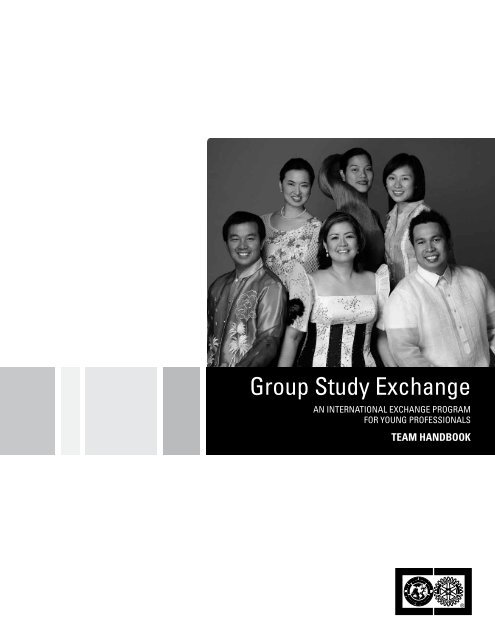
![La présidence du club [222-FR] - Rotary International](https://img.yumpu.com/25855726/1/190x245/la-presidence-du-club-222-fr-rotary-international.jpg?quality=85)
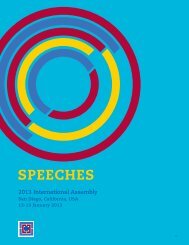
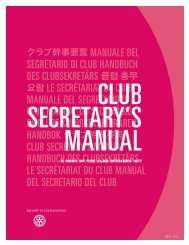
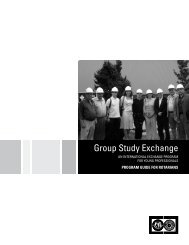
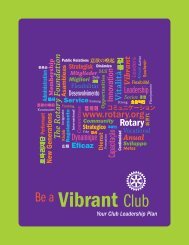
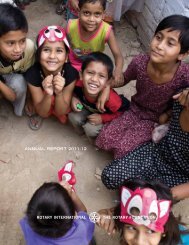
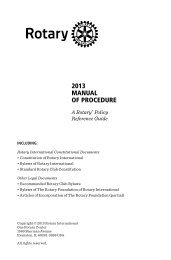


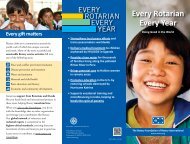
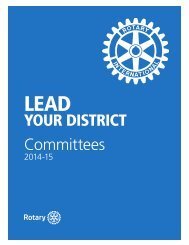
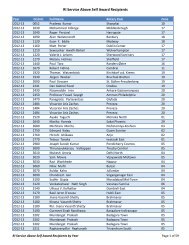
![La conférence de district [800-FR] - Rotary International](https://img.yumpu.com/25855636/1/190x245/la-conference-de-district-800-fr-rotary-international.jpg?quality=85)
